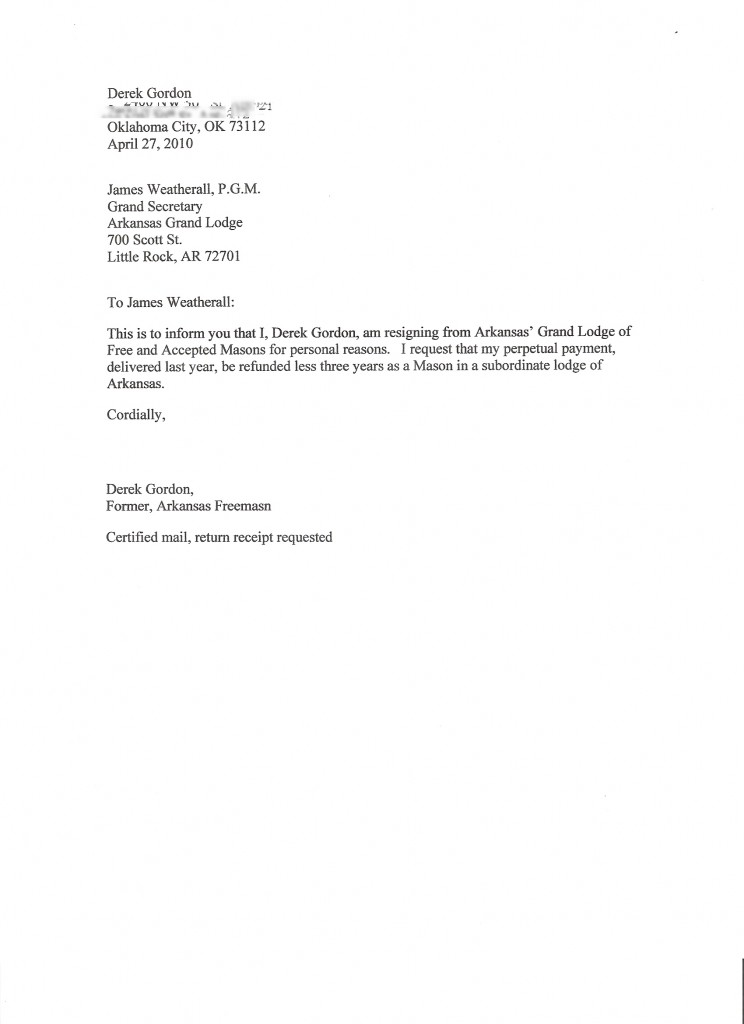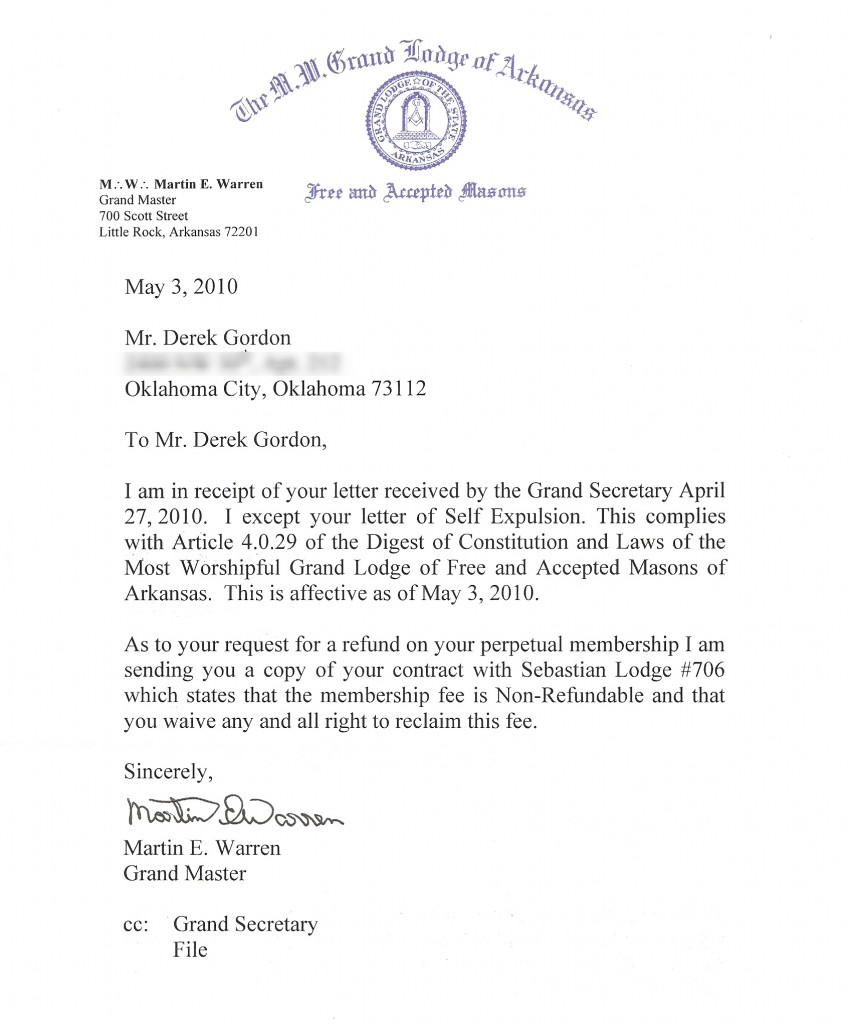
I Resign
“Ignorance, allied with power, is the most ferocious enemy justice can have.” – James Baldwin
“I resign.” Those were the words of Derek Gordon in a terse certified letter to the Grand Lodge of Arkansas. No long drawn out accusations, no reprimands, no recrimination, just “I resign.”Faced with what he felt was a rigged kangaroo court, Gordon saw he had little other options. Why subject himself to the humiliation his Grand Lodge was about to heap upon him. He knew in his heart that he did no wrong and remained true to the real spirit of Freemasonry. If one way or the other he was going to go then it would be on his terms not the terms of a tyrannical closed society purging its membership of any dissenters or freethinkers.
The option Gordon took was one the Grand Lodge of Arkansas said was not available. You cannot resign, they told him, and since you are under charges we will not give you a demit. Such were the machinations of a power thirsty Grand Lodge with an Ahmadinejad prototype as Grand Master. This Grand Lodge, like a number of others in the United States, felt that it could rule arbitrarily and make up the laws, rules and regulations on the fly to thwart every challenge to their despotic ways. They pushed through a non electronic Masonic communication law on the spur of the moment in order to have an excuse on which to hang their phony charges against Gordon. They refused to reveal specifically what he had done wrong, telling him to come enter the “Lion’s Den” and then we will tell you all about how we are going to screw, blue and tattoo you.


The Grand Lodge of Arkansas rigged the rules so that once they had you under charges there was no way for you to escape, or so they said. This enabled them to rule by fear and keep anybody not toeing the party line on the outside looking in. If you were up on charges, which were often made up bogus violations, then the Grand Lodge gave you two choices, submit to a Masonic trial (predetermined outcome) or fill out a form to self expel yourself, in the process also self blackballing yourself from every other jurisdiction in the United States. It resembles the choice of death by a firing squad or death by the electric chair. Self expulsion is also akin to “tar and feathering” yourself and if you refuse to sign the form or attend your Masonic trial they will try you in absentia. In other words if you don’t tar and feather yourself we will do it for you. This process cannot be inspired by Masonic practice; rather it seems to have been borrowed from the KKK.

Gordon’s position was that he was a volunteer not a paid member of staff and therefore he had every right to resign, especially if he felt he was not being treated well. Even President Nixon was allowed to resign under fire.
Many a fellow Mason, responding to the case of Frank Haas and the Grand Lodge of West Virginia, Gate City Lodge and the Grand Lodge of Georgia and most recently Derek Gordon and the Grand Lodge of Arkansas, has repeatedly said that whatever a Grand Lodge decides and whatever it rules it is within its rights and taking the dispute outside of Freemasonry into the civil courts is wrong. These well intentioned Brothers tell us that Freemasonry is a private organization and rules itself as a power unto itself and that bringing the profane into adjudication is both Masonically illegal and immoral.
That couldn’t be farther from the truth. Most Grand Lodges today are public corporations. It would be very foolish in today’s world not to be. The limited liability and the tax advantages are just too great for a multimillion dollar organization like Freemasonry to pass up. But to attain these advantages a company or organization must sign onto the articles of incorporation and the corporate and nonprofit laws, – secular, civil rules that supersede any Masonic traditions or by-laws, rules and regulations of Grand Lodges. This was reported in an earlier Beehive column that seemed to generate little comment or attention.
Well let’s take the common practice of Grand Masters to rule and govern by edict when the Grand Lodge is not in Session. Most Grand Lodge by-laws stipulate that the Grand Master rules in absentia. This is a Masonic tradition and how most Grand Lodges have been governed for centuries. However, in most cases, depending on the state, this is not legally correct. Most state’s corporation rules state that the corporation is governed by a Board of Directors when the Grand Lodge is not in session. Corporate rules supersede any organization’s by-laws. This means that the Grand Master cannot decide matters at all, he must refer all business over to the Board.
Thus when a Grand Master sandbags a Brother by showing up at his Lodge under false pretenses and then expelling him by edict, that action may be blatantly illegal. Likewise, when a Grand Master visits a Lodge and promptly pulls its charter and closes it down, that too may be illegal. In other areas of corporate law it may also be illegal to file vague charges against a volunteer or employee without specifically informing the accused of exactly the offense that was violated and in what manner. Some Grand Masters pay little or no attention to the civil laws which they are required to adhere to. If more Masons knew of this situation perhaps they would call them on it.
So when a Grand Lodge becomes a corporation it agrees to abide by the rules and regulations of incorporation and the corporate and nonprofit civil laws that accompany them, first and foremost, over ruling any previously held positions when in conflict. Furthermore, one can no longer say that Freemasonry is a private organization or that it should not operate in the civil public domain. By becoming a public corporation and operating under the rules of a public corporation it has the same status as General Motors and under the present administration could be deemed too big to fail and therefore, if in trouble, could be taken over by the state. Lastly as a public corporation its membership and the entire public community has the right to look at its tax, revenues and payroll records as well as its charitable contributions as filed with the government.
THE BIGGEST THING FREEMASONS TODAY NEED TO FACE IS THAT FREEMASONRY IS NO LONGER A PRIVATE SOCIETY.
Let’s take a look at what Arkansas expects of its nonprofit and volunteer organizations.
The state of Arkansas has published guidelines for its nonprofit and volunteer organizations. Arkansas Governor Mike Beebe explains what his state has put in place.
“I am proud to introduce this new publication, ‘Legal Guide For Arkansas Nonprofit and Volunteer Organizations,’ a resource and guide for nonprofit and volunteer management organizations. It is the result of a collaborative effort between the UALR, Bowen School of Law, the Department of Human Services Division of Volunteerism, the Arkansas Service Commission, and Williams & Anderson PLC. Together, their efforts are a model for public-private partnerships. I am confident that this manual will become an indispensable tool for nonprofit and volunteer organizations as they work to improve the quality of life for all Arkansans.” – Governor Mike Beebe
You can read the entire text of this document here: http://www.law.ualr.edu/nonprofit-guide/legalguidearknonprofitbook.pdf
Legal Guide for Arkansas
Nonprofit and Volunteer
Organizations
Resignation of a Volunteer
Volunteers may, of course, resign at any time. Since
volunteers are vital to the functioning of most nonprofit
organizations, they should be asked to give notice of their
resignations as soon as possible. Job descriptions should include
information about how much notice the organization requests for
that particular job, depending on the needs of the organization.
Pg. 98
Discrimination
Title VII of the federal Civil Rights Act of 1991 prohibits
employers of fifteen (15) employees or more, whether for-profit
or nonprofit, from discriminating on the basis of race, color,
religion, sex, or national origin.37 The Age Discrimination in
Employment Act of 196738 and the Americans with Disabilities
Act of 199039 prohibit discrimination based on age and disability.
Although state civil rights laws vary, the Arkansas Civil
Rights Act of 1993 also prohibits discrimination and applies to
employers of nine (9) or more.40
Nevertheless, a nonprofit should implement
non-discriminatory practices and procedures even if it has
few “employees” who may sue for discrimination. The most
obvious reason is that it is the right thing to do; a more practical
consideration is that the organization may eventually grow into
civil rights law coverage.
One of the most effective ways to avoid discrimination
and the appearance of discrimination is to make sure that the
organization reflects the diversity of the community served.
Directors, officers, volunteers and employees should reflect
diversity of, for example, age, race, sex, religion, national origin
and disability. Many groups also feel the need for other types of
diversity, such as geographic and socio-economic.
Pgs 94-95
According to the 2000 census Arkansas’ population is 15.7% African American. How does the Grand Lodge of Arkansas reflect this diversity? Is 15.7 % of its membership African American?, 10%?, 5%?, 1%?, any at all? Does anyone know of at least one African American that belongs to the Grand Lodge of Arkansas?
Now let’s take a look at what the state of Arkansas demands of its nonprofit corporations.
“THE ARKANSAS NONPROFIT CORPORATION ACT OF 1993.”
AR LEGIS 1147 (1993)
SECTION 620. Resignation
(a) A member may resign at any time.
(b) The resignation of a member does not relieve the member from any
obligations the member may have to the corporation as a result of
obligations incurred or commitments made prior to resignation.SECTION 621. Termination, Expulsion And Suspension
(a) No member of a public benefit or mutual benefit corporation may be
expelled or suspended, and no membership or memberships in such
corporations may be terminated or suspended except pursuant to a procedure
that is fair and reasonable and is carried out in good faith.
(b) A procedure is fair and reasonable when either:
(1) the articles or bylaws set forth a procedure that provides:
(i) not less than fifteen days prior written notice of the expulsion,
suspension or termination and the reasons therefore; and
(ii) an opportunity for the member to be heard, orally or in writing, not
less than five days before the effective date of the expulsion, suspension
or termination by a person or persons authorized to decide that the
proposed expulsion, termination or suspension not take place; or
(2) it is fair and reasonable taking into consideration all of the relevant
facts and circumstances.
(c) Any written notice given by mail must be given by first-class or
certified mail sent to the last address of the member shown on the
corporation’s records.
(d) Any proceeding challenging an expulsion, suspension or termination,
including a proceeding in which defective notice is alleged, must be
commenced within one year after the effective date of the expulsion,
suspension or termination.
(e) A member who has been expelled or suspended may be liable to the
corporation for dues, assessments or fees as a result of obligations
incurred or commitments made prior to expulsion or suspension.
There is a catch to all this:
Arkansas Nonprofit Corporation Act
There are two versions of the Arkansas Nonprofit Corporation Act, (“ANPCA”), one passed in 1963, and one passed in 1993. Corporations created prior to 1993 are subject to the 1963 Act, unless they choose to subject themselves to the 1993 Act. Any organizations incorporated after 1993 are subject to the 1993 Act. – Arkansas Attorney General’s Office
So the Grand Lodge of Arkansas may be grandfathered out of many of these requirements as it was incorporated in 1846. Yet many Arkansas nonprofit corporations realizing that the post civil rights era of legislation has seen many changes drastically transforming society have signed onto the 1993 act voluntarily. Many also have done so because the new Act protects the interest of members and ensures against deception and mistreatment. For some it becomes not what you can get away with but rather what is the spirit of the times and how can I join in to be a part of it. Sadly it seems that the Grand Lodge of Arkansas would rather live in the Civil War era and operate under the rules of a bygone era. How Masonic is that?
We say that Freemasonry has its own law yet we admonish all within the Craft to uphold the civil government and obey the civil statutes. Does that mean that Freemasonry can knowingly try to operate with Masonic Law that is in direct conflict with Civil Law?
Let’s review what we have learned from this event.
1) This is no longer your Grandfather’s Chevrolet …..er Grand Lodge. Freemasonry must stop living in the past as West Virginia and Arkansas are doing. Instead it needs to adapt to the mores of present day society.
2) Running a closed society that allows no freedom of expression and muzzles its members is antithetical to Freemasonry of the Enlightenment.
3) Operating a society with laws, rules and regulations that conflict with civil law and civil rights is not only not in the spirit of Freemasonry but also blatantly immoral.
4) An organization in this day and age, especially a nonprofit volunteer one, cannot realistically force a person against his will to remain a member. It should be the option of any Freemason to simply resign from any Grand Lodge.
5) Making up silly and vindictive rules such as prohibiting members from using the Internet or any electronic means to discuss Freemasonry is unbecoming and un-Masonic.
6) It’s been almost 50 years since Martin Luther King and the Civil Rights movement transformed America. It is past time that Grand Lodges reflected that change.
7) It is painfully evident that Grand Lodges can no longer operate as they have done in the past. This is the 21st century with new ways of looking at different lifestyles and morality. Grand Lodges are now in a public-private partnership yet they refuse to recognize their duty to civil law and their new commitments. Failure of Freemasonry to operate within the framework of present day moral, societal and political civil practice could be very costly to the Craft.
Finally let us dispense with the notion that holding Freemasonry accountable in civil court is against Masonic moral law. It is Grand Lodges who took themselves out of staying a purely private organization and into the civil world of corporate non-profits. You can’t have your cake and eat it too. And you can’t talk out of both sides of your mouth. If you want the benefits of a nonprofit corporation than abide by the civil laws that go with it and govern your Grand Lodge in the spirit of the law as it was intended.
The Beehive urges every Freemason in the U.S.A. to investigate the process its Grand Lodge is using and to educate himself on how it operates, to use the Freedom of Information Act when needed and to hold his Grand Lodge, a nonprofit corporation, accountable in civil court when necessary.

Derek Gordon is not going to self expel himself, nor is he going to attend his Masonic trial. Attempts by the Grand Lodge of Arkansas to redefine what he has done is futile. HE HAS RESIGNED – NOT SELF EXPELLED HIMSELF. To the Grand Lodge of Arkansas, accept the resignation of Derek Gordon and put an end to your foolishness.
This is not the Civil War era, this is the Information Age and we are all watching you.
![]()